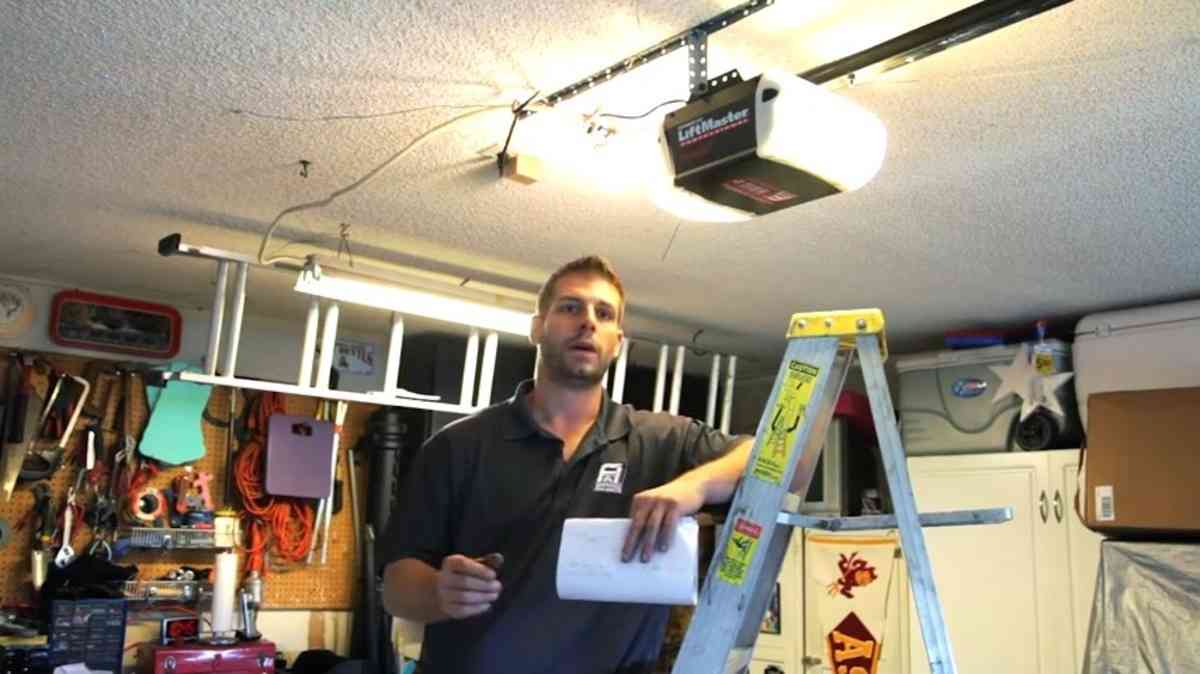Affiliate Disclosure: We may earn money or products from the companies mentioned in this post.
If your garage door opener makes a lot of noise, it can be a major distraction and nuisance to you and your neighbours.
Fortunately, there are several ways to reduce the noise level of your garage door opener, ranging from simple maintenance tasks to an upgrade to a quieter model.
How Can I Make My Garage Door Opener Quieter?
Have you ever been woken up in the middle of the night by the sound of your garage door opening or closing?
Or maybe you’ve noticed that your garage door opener is making more noise than usual, disrupting your peaceful evenings at home. If this sounds familiar, you’re not alone.
1. Lubricate the moving parts
The first step in making your garage door opener quieter is to lubricate the moving parts. Over time, the metal components of your opener can start to rub against each other, causing the noise.
A good lubricant can help to reduce this friction and keep things running smoothly. You can use a spray lubricant like WD-40 or a silicone-based lubricant.
Be sure to apply the lubricant to all moving parts, including the hinges, rollers, and springs.
2. Tighten loose hardware
Another cause of noisy garage door openers is loose hardware. If the nuts and bolts that hold your opener together are loose, it can cause noise vibrations.
Check all the hardware on your opener and tighten any loose screws or bolts.
3. Replace worn rollers
Worn rollers can also contribute to a noisy garage door opener. If your rollers are worn or damaged, they can cause the door to wobble and make noise.
Replace any worn rollers with new ones to reduce noise and ensure your garage door operates smoothly.
4. Install vibration isolators
If you’ve tried lubricating and tightening the hardware on your garage door opener, but it’s still making noise, you might want to try installing vibration isolators.
These rubber pads can be installed between the motor of your opener and the mounting brackets. The rubber absorbs the vibrations that cause noise, making your opener much quieter.
5. Replace the opener
If your garage door opener is old or in poor condition, it might be time to replace it. Newer models are designed to be much quieter than older ones, and they also have features like automatic reversal that can help keep you and your family safe.
A new opener might be a bit of an investment, but it can be well worth it if it helps to reduce noise and improve the functionality of your garage door.
What are the common causes of a noisy garage door opener?
Garage door openers are incredibly useful and convenient devices that allow us to open and close our garage doors with a button easily.
However, they can also be quite noisy, a nuisance for homeowners and neighbours.
1. Worn Out Garage Door Opener Components
Over time, the various parts of a garage door opener, such as the rollers, bearings, and chains, can become worn out and start to produce noise during operation. This is a common cause of a noisy garage door opener.
The rollers, which help the door move up and down smoothly, can become worn out, leading to a loud screeching sound.
Similarly, the bearings supporting the garage door’s weight can become rusted or damaged, causing a grinding noise during operation. If you notice these symptoms, it may be time to replace the worn-out components.
2. Loose Hardware
Another common cause of a noisy garage door opener is loose hardware. Over time, the nuts and bolts holding the various components of the garage door opener in place can become loose, causing them to rattle or vibrate during operation.
Tighten loose hardware with a wrench or socket set to fix this problem. This will help to reduce the noise and prevent further damage to the garage door opener.
3. Lack of Lubrication
The moving parts of a garage door opener require proper lubrication to operate smoothly and quietly. The components can become dry without proper lubrication and produce noise during operation.
To fix this problem, apply a small amount of garage door lubricant to the various moving parts of the opener, such as the rollers, tracks, and chains. This will help to reduce friction and noise during operation.
What type of lubrication should I use to reduce the noise of my garage door opener?
If you want to reduce the noise of your garage door opener, the best type of lubrication is a silicone-based lubricant specifically designed for garage doors.
By applying the right lubrication correctly, you can extend the life of your garage door opener and enjoy a quieter home.
When choosing a silicone-based lubricant for your garage door opener, look for a product specifically designed for garage doors.
These lubricants are typically formulated to be thicker than other silicone lubricants, which makes them better at reducing noise and protecting your garage door opener.
To apply the lubricant, start by cleaning the parts of your garage door opener that need lubrication. Use a cloth to remove any dirt, debris, or old lubricant. Then, apply the lubricant to the moving parts, including the chains, rollers, and hinges. Be sure to apply the lubricant evenly and avoid using too much, which can attract dust and debris.
It’s also important to note that you should never use WD-40 as a lubricant for your garage door opener. WD-40 is a solvent, not a lubricant, and can cause more harm than good. It can break down the lubricant in your garage door opener and attract dust and debris.
Can insulation of the garage door help reduce noise from the garage door opener?
If you’re looking for a way to reduce noise in your garage, insulating your garage door is an excellent solution.
Not only can it help reduce noise from your garage door opener, but it can also help regulate the temperature in your garage and reduce energy costs. Insulation kits are readily available and easy to install, so there’s no reason not to try them.
Chain-driven openers are the most common and noisiest, producing a rattling sound as the chain moves along the metal rail. On the other hand, Belt-driven openers use a rubber belt to move the door, making them much quieter than chain-driven openers. Screw-driven openers use a threaded rod to move the door, which can produce a grinding noise.
The most common materials used for insulation are fibreglass, foam, and reflective foil. Fiberglass insulation is the most popular option and is relatively easy to install. Foam insulation is more expensive but offers better sound insulation than fibreglass.
Reflective foil insulation is the least effective for sound insulation but can be used with other insulation types for maximum sound reduction.
The effectiveness of insulation in reducing noise depends on the type and quality of insulation you use. The thicker the insulation, the better it will be at reducing noise. Additionally, insulation with a high noise reduction coefficient (NRC) rating will be more effective at reducing sound than insulation with a lower NRC rating.
To insulate your garage door, you’ll need to measure the size of the door and purchase the appropriate amount of insulation material.
The insulation is typically cut to size and attached to the inside of the garage door using adhesive or double-sided tape.
Once the insulation is installed, you’ll notice a significant noise reduction produced by your garage door opener.
How can I check the balance of my garage door to prevent unnecessary noise?
An unbalanced garage door not only produces loud and annoying sounds but can also cause damage to the door opener and other components of the system.
Fortunately, checking the balance of your garage door is a simple task that can be done in just a few minutes.
Step 1: Disconnect the Opener
Before you check the balance of your garage door, you need to ensure that the door is in a closed position and the opener is disconnected. This is an important safety precaution to prevent any accidents or injuries.
Step 2: Release the Door from the Opener
Most garage doors have a release lever that disconnects the opener from the door. Look for this lever on the opener track and pull it down to release the door.
Step 3: Lift the Door Manually
Once the door is released from the opener, you can lift it manually. Lift the door about halfway up and let go. If the door stays in place, it is well-balanced. If it falls or rises on its own, the door is unbalanced.
Step 4: Test the Other Side of the Door
Repeat the process on the other side of the door. If both sides are balanced, the door should stay in place when lifted to the halfway point.
Step 5: Adjust the Springs
If the door is unbalanced, the springs likely need to be adjusted. Springs are responsible for counterbalancing the door’s weight, making it easy to open and close. If the springs are not adjusted correctly, the door will become unbalanced and noisy.
It is important to note that adjusting garage door springs can be dangerous, especially if you are not experienced with this type of work. If you are uncomfortable adjusting the springs, it is best to call a professional to do it for you.
What are the benefits of having a quieter garage door opener?
First and foremost, a quieter garage door opener can reduce noise pollution. This is particularly important if you live in a densely populated area or have neighbours who live nearby. A loud garage door opener can be a major noise source, especially if you use it frequently throughout the day. A quieter garage door opener can help reduce noise and make your home more peaceful.
In addition to reducing noise pollution, a quieter garage door opener can provide a more enjoyable experience. If you have ever been woken up by a loud garage door opener early in the morning or late at night, you know how disruptive it can be.
A quieter garage door opener can eliminate this problem and allow you to open and close your garage door without disturbing anyone in the household.
Another benefit of a quieter garage door opener is that it can increase the value of your home. If you plan to sell your home, a quieter garage door opener can attract potential buyers.
A quieter garage door opener can also make your home more appealing to neighbours and visitors, as they will not be disturbed by the sound of your door opening and closing.
Finally, a quieter garage door opener can be more reliable and efficient. Older garage door openers can be prone to breakdowns and malfunctions, which can be frustrating and expensive to repair.
A quieter garage door opener can provide a more efficient and reliable operation, reducing the likelihood of breakdowns and extending the lifespan of your garage door opener.
More Blog Posts To Read
Why Do Led Light Bulbs Interfere With Garage Door Openers?


